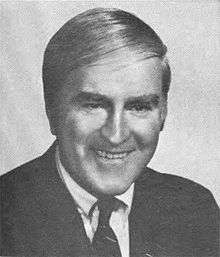Cornelius Edward Gallagher
| Cornelius Edward Gallagher | |
|---|---|
 | |
| Member of the U.S. House of Representatives from New Jersey's 13th district | |
|
In office January 3, 1959 – January 3, 1973 | |
| Preceded by | Alfred D. Sieminski |
| Succeeded by | Joseph J. Maraziti |
| Personal details | |
| Born |
March 2, 1921 Bayonne, New Jersey |
| Political party | Democratic |
| Residence | Columbia, New Jersey |
| Alma mater |
John Marshall College John Marshall Law School |
Cornelius Edward "Neil" Gallagher (born March 2, 1921) is an American Democratic Party politician who represented New Jersey's 13th congressional district in the United States House of Representatives from 1959-1973.
Biography
Gallagher was born in Bayonne, New Jersey and attended the local schools of Bayonne and graduated from John Marshall College in 1946; in 1945 and 1946 he was a member of the faculty of Rutgers University. He also graduated from John Marshall Law School with an LL.B. in 1948, and engaged in additional studies at New York University in 1948 and 1949. Gallagher was admitted to the bar in 1949.
During World War II, Gallagher commanded an infantry rifle company in general George S. Patton's Third Army in Europe and served from September 1941 until discharged as a captain in November 1946. During the Korean War he served one year.
Gallagher was appointed a director of the Broadway National Bank, and was elected to the Hudson County Board of Chosen Freeholders in 1953, a post he held until resigning in 1956, when he was appointed commissioner of the New Jersey Turnpike Authority. Gallagher was also a delegate to the Democratic National Conventions of 1952, 1956 and 1960.
He was elected as a Democrat to the Eighty-sixth through Ninety-second Congresses (January 3, 1959 – January 3, 1973).
Conflict with J. Edgar Hoover
As a congressman, Gallagher became an activist against government surveillance of citizens, and chaired the Invasion of Privacy Subcommittee.[1] Gallagher was a critic of the tactics of Federal Bureau of Investigation chief J. Edgar Hoover (whom he compared to Soviet secret police administrator Lavrentiy Beriya) and Attorney General Robert Kennedy. Gallagher was approached by attorney Roy Cohn, who asked him on behalf of Hoover to hold hearings which would shift the blame for government surveillance from Hoover to Kennedy. Gallagher refused.[2] When media accounts surfaced, including in Life magazine,[3] which contained alleged leaked material from FBI wiretaps suggesting that Gallagher was connected to the mafia, Gallagher accused Hoover of fabricating the stories to hound him from public life.[4][5] Cohn met with Gallagher again, demanding on Hoover's behalf that he resign or face further allegations.[6] Gallagher plead guilty in 1972 to tax evasion and perjury.[7]
Gallagher subsequently became vice president of Baron/Canning International in New York City, and is a resident of Columbia, New Jersey.
References
- ↑ Biographical sketch, congressional archives, University of Oklahoma
- ↑ Summers, Anthony, Official and Confidential: the Secret Life of J. Edgar Hoover, Open Road Media, Jan 17, 2012
- ↑ Biographical sketch, congressional archives, University of Oklahoma
- ↑ MafiaNJ.com presents La Cosa Nostra, State of New Jersey Commission of Investigation 1989 Report, GET NJ, Jersey City N.J. p. 38.
- ↑ Gentry, Curt, J. Edgar Hoover, the Man and his Secrets, W. W. Norton & Company, Feb 17, 2001
- ↑ Summers, Anthony, Official and Confidential: the Secret Life of J. Edgar Hoover, Open Road Media, Jan 17, 2012
- ↑ Biographical sketch, congressional archives, University of Oklahoma
External links
- United States Congress. "Cornelius Edward Gallagher (id: G000016)". Biographical Directory of the United States Congress.
- Cornelius E. Gallagher Collection and Photograph Collection at the Carl Albert Center
| United States House of Representatives | ||
|---|---|---|
| Preceded by Alfred D. Sieminski |
Member of the U.S. House of Representatives from New Jersey's 13th congressional district January 3, 1959-January 3, 1973 |
Succeeded by Joseph J. Maraziti |